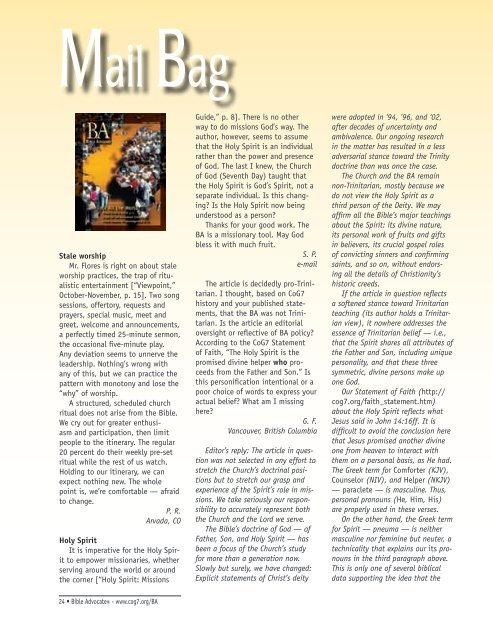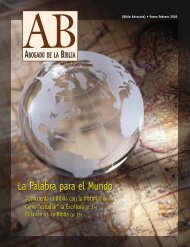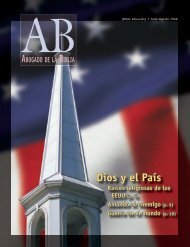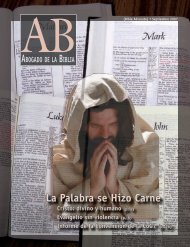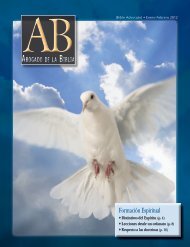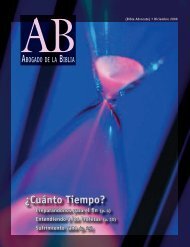English PDF - The Bible Advocate Online
English PDF - The Bible Advocate Online
English PDF - The Bible Advocate Online
Create successful ePaper yourself
Turn your PDF publications into a flip-book with our unique Google optimized e-Paper software.
Mail Bag<br />
Stale worship<br />
Mr. Flores is right on about stale<br />
worship practices, the trap of ritualistic<br />
entertainment [“Viewpoint,”<br />
October-November, p. 15]. Two song<br />
sessions, offertory, requests and<br />
prayers, special music, meet and<br />
greet, welcome and announcements,<br />
a perfectly timed 25-minute sermon,<br />
the occasional five-minute play.<br />
Any deviation seems to unnerve the<br />
leadership. Nothing’s wrong with<br />
any of this, but we can practice the<br />
pattern with monotony and lose the<br />
“why” of worship.<br />
A structured, scheduled church<br />
ritual does not arise from the <strong>Bible</strong>.<br />
We cry out for greater enthusiasm<br />
and participation, then limit<br />
people to the itinerary. <strong>The</strong> regular<br />
20 percent do their weekly pre-set<br />
ritual while the rest of us watch.<br />
Holding to our itinerary, we can<br />
expect nothing new. <strong>The</strong> whole<br />
point is, we’re comfortable — afraid<br />
to change.<br />
P. R.<br />
Arvada, CO<br />
Holy Spirit<br />
It is imperative for the Holy Spirit<br />
to empower missionaries, whether<br />
serving around the world or around<br />
the corner [“Holy Spirit: Missions<br />
Guide,” p. 8]. <strong>The</strong>re is no other<br />
way to do missions God’s way. <strong>The</strong><br />
author, however, seems to assume<br />
that the Holy Spirit is an individual<br />
rather than the power and presence<br />
of God. <strong>The</strong> last I knew, the Church<br />
of God (Seventh Day) taught that<br />
the Holy Spirit is God’s Spirit, not a<br />
separate individual. Is this changing?<br />
Is the Holy Spirit now being<br />
understood as a person?<br />
Thanks for your good work. <strong>The</strong><br />
BA is a missionary tool. May God<br />
bless it with much fruit.<br />
S. P.<br />
e-mail<br />
<strong>The</strong> article is decidedly pro-Trinitarian.<br />
I thought, based on CoG7<br />
history and your published statements,<br />
that the BA was not Trinitarian.<br />
Is the article an editorial<br />
oversight or reflective of BA policy?<br />
According to the CoG7 Statement<br />
of Faith, “<strong>The</strong> Holy Spirit is the<br />
promised divine helper who proceeds<br />
from the Father and Son.” Is<br />
this personification intentional or a<br />
poor choice of words to express your<br />
actual belief? What am I missing<br />
here?<br />
G. F.<br />
Vancouver, British Columbia<br />
Editor’s reply: <strong>The</strong> article in question<br />
was not selected in any effort to<br />
stretch the Church’s doctrinal positions<br />
but to stretch our grasp and<br />
experience of the Spirit’s role in missions.<br />
We take seriously our responsibility<br />
to accurately represent both<br />
the Church and the Lord we serve.<br />
<strong>The</strong> <strong>Bible</strong>’s doctrine of God — of<br />
Father, Son, and Holy Spirit — has<br />
been a focus of the Church’s study<br />
for more than a generation now.<br />
Slowly but surely, we have changed:<br />
Explicit statements of Christ’s deity<br />
were adopted in ‘94, ’96, and ‘02,<br />
after decades of uncertainty and<br />
ambivalence. Our ongoing research<br />
in the matter has resulted in a less<br />
adversarial stance toward the Trinity<br />
doctrine than was once the case.<br />
<strong>The</strong> Church and the BA remain<br />
non-Trinitarian, mostly because we<br />
do not view the Holy Spirit as a<br />
third person of the Deity. We may<br />
affirm all the <strong>Bible</strong>’s major teachings<br />
about the Spirit: its divine nature,<br />
its personal work of fruits and gifts<br />
in believers, its crucial gospel roles<br />
of convicting sinners and confirming<br />
saints, and so on, without endorsing<br />
all the details of Christianity’s<br />
historic creeds.<br />
If the article in question reflects<br />
a softened stance toward Trinitarian<br />
teaching (its author holds a Trinitarian<br />
view), it nowhere addresses the<br />
essence of Trinitarian belief — i.e.,<br />
that the Spirit shares all attributes of<br />
the Father and Son, including unique<br />
personality, and that these three<br />
symmetric, divine persons make up<br />
one God.<br />
Our Statement of Faith (http://<br />
cog7.org/faith_statement.htm)<br />
about the Holy Spirit reflects what<br />
Jesus said in John 14:16ff. It is<br />
difficult to avoid the conclusion here<br />
that Jesus promised another divine<br />
one from heaven to interact with<br />
them on a personal basis, as He had.<br />
<strong>The</strong> Greek term for Comforter (KJV),<br />
Counselor (NIV), and Helper (NKJV)<br />
— paraclete — is masculine. Thus,<br />
personal pronouns (He, Him, His)<br />
are properly used in these verses.<br />
On the other hand, the Greek term<br />
for Spirit — pneuma — is neither<br />
masculine nor feminine but neuter, a<br />
technicality that explains our its pronouns<br />
in the third paragraph above.<br />
This is only one of several biblical<br />
data supporting the idea that the<br />
24 • <strong>Bible</strong> <strong>Advocate</strong>® - www.cog7.org/BA


